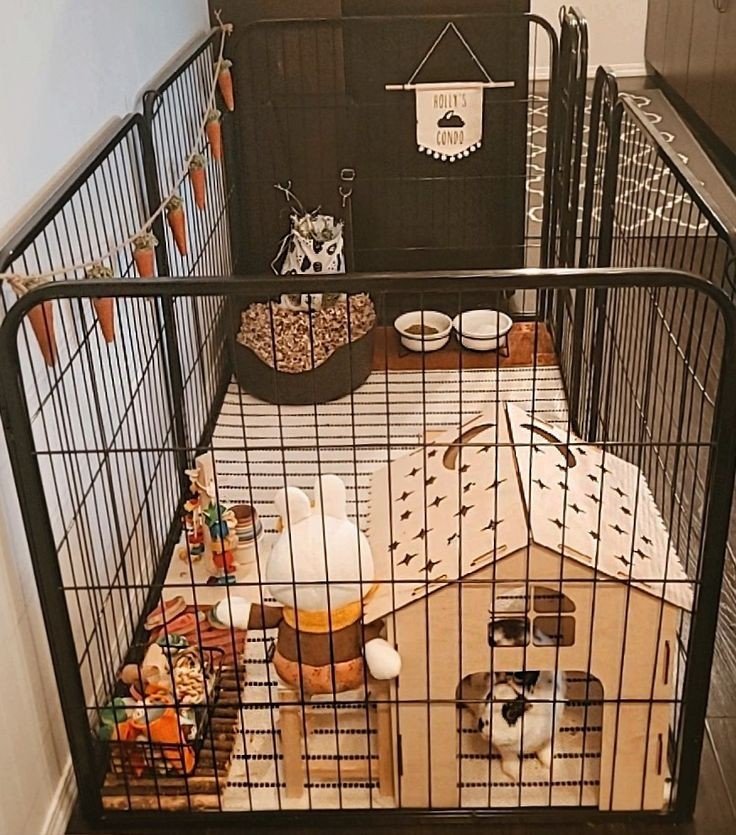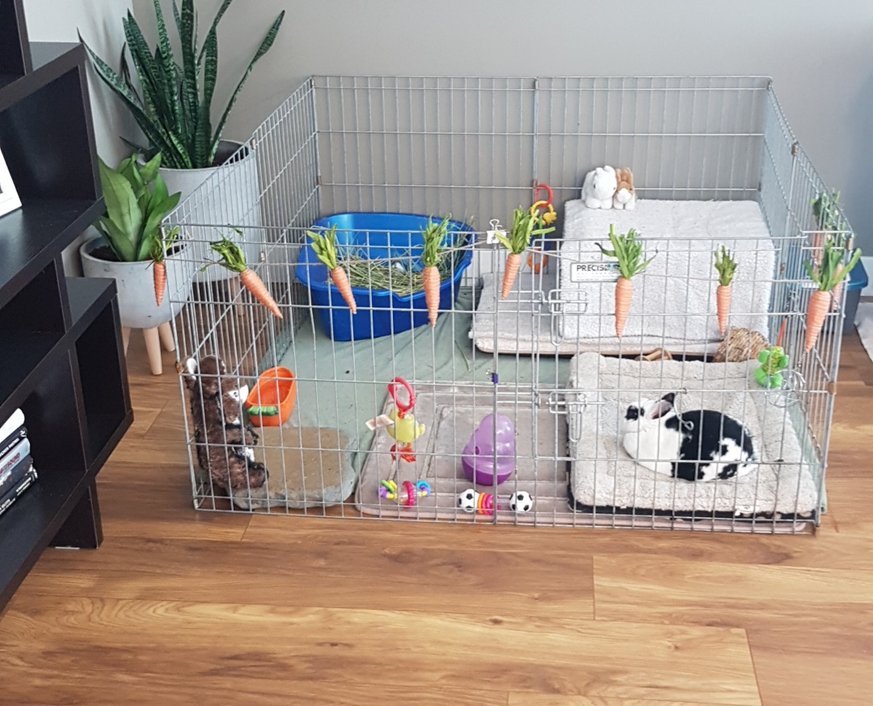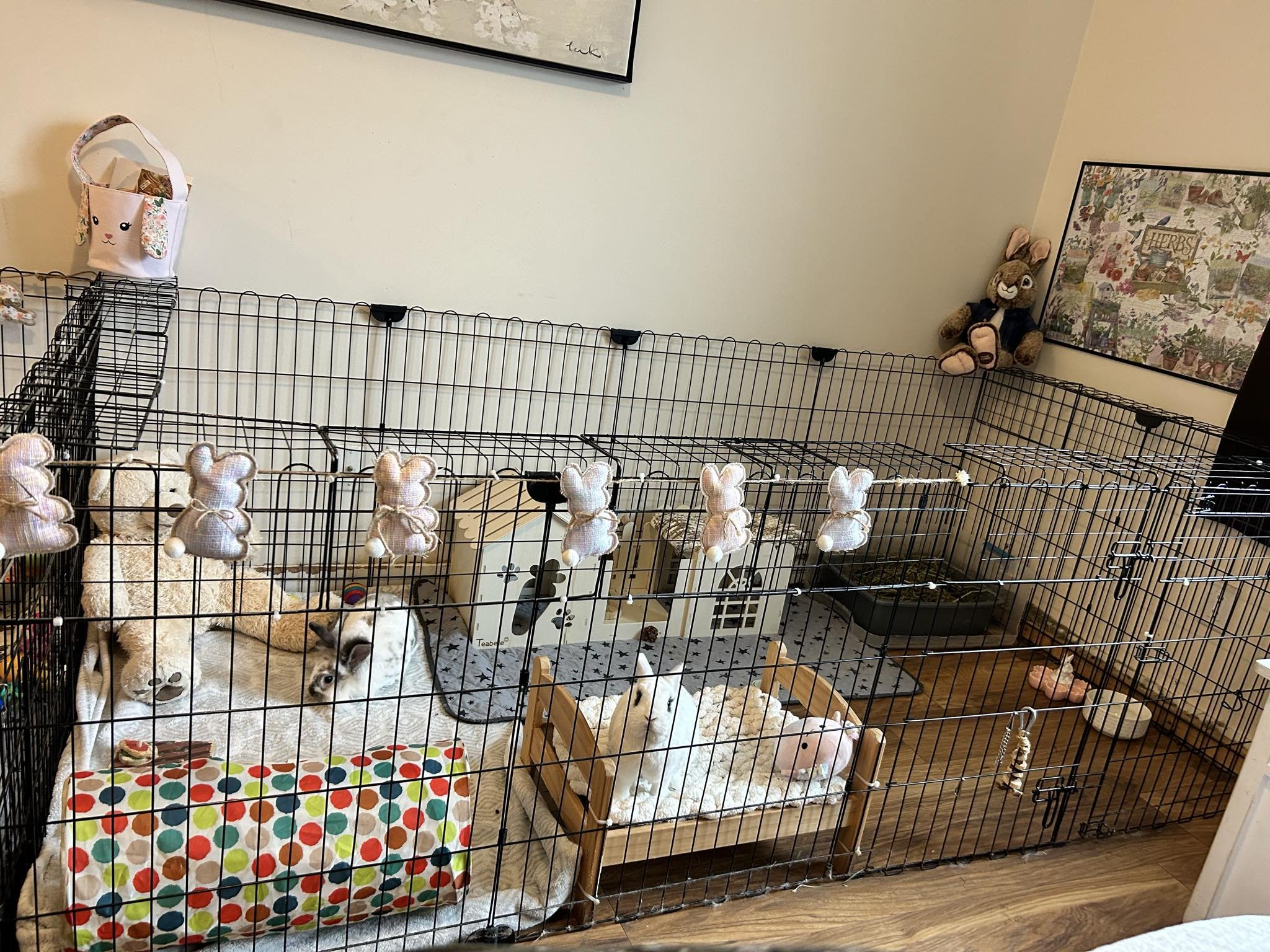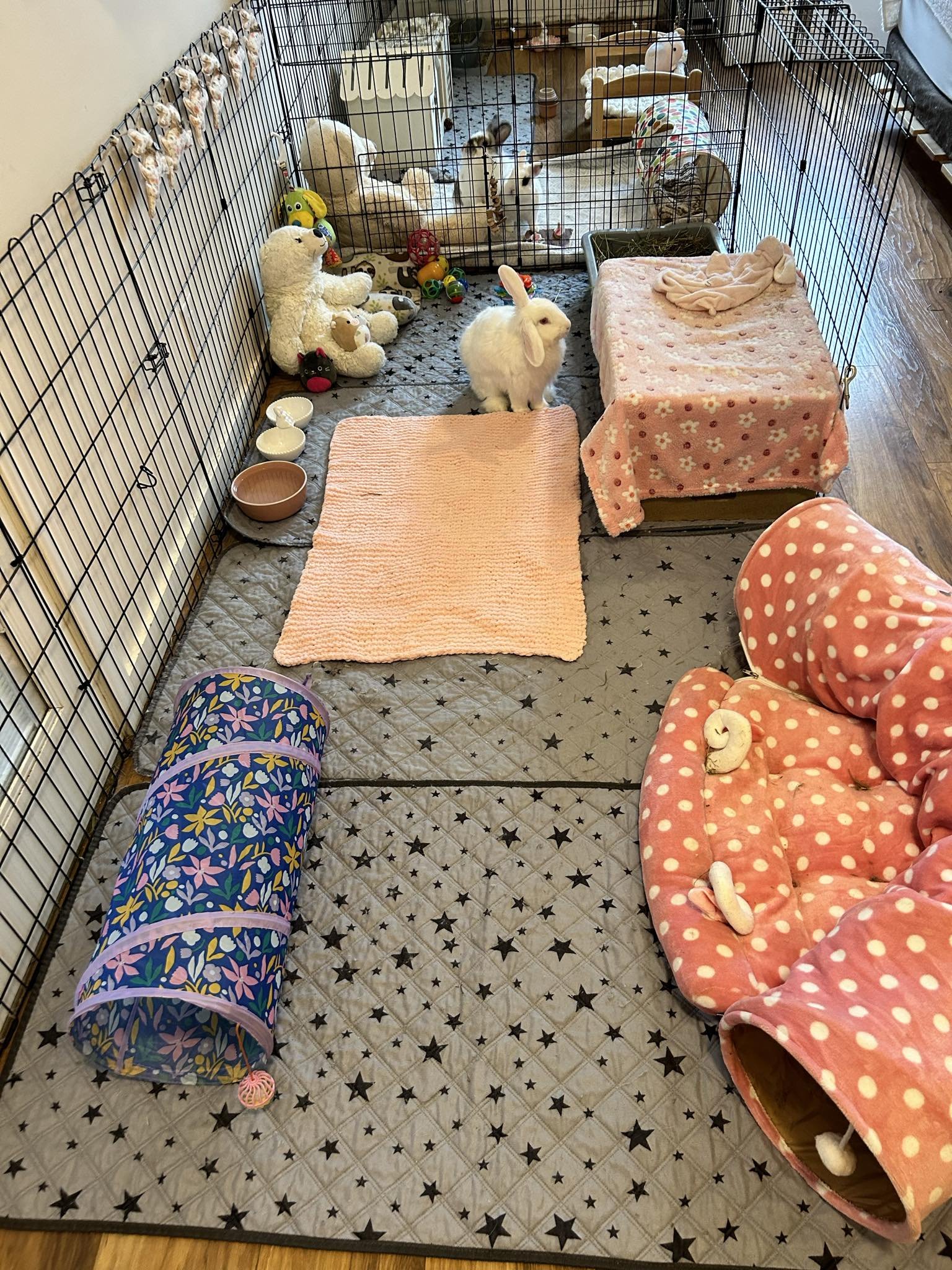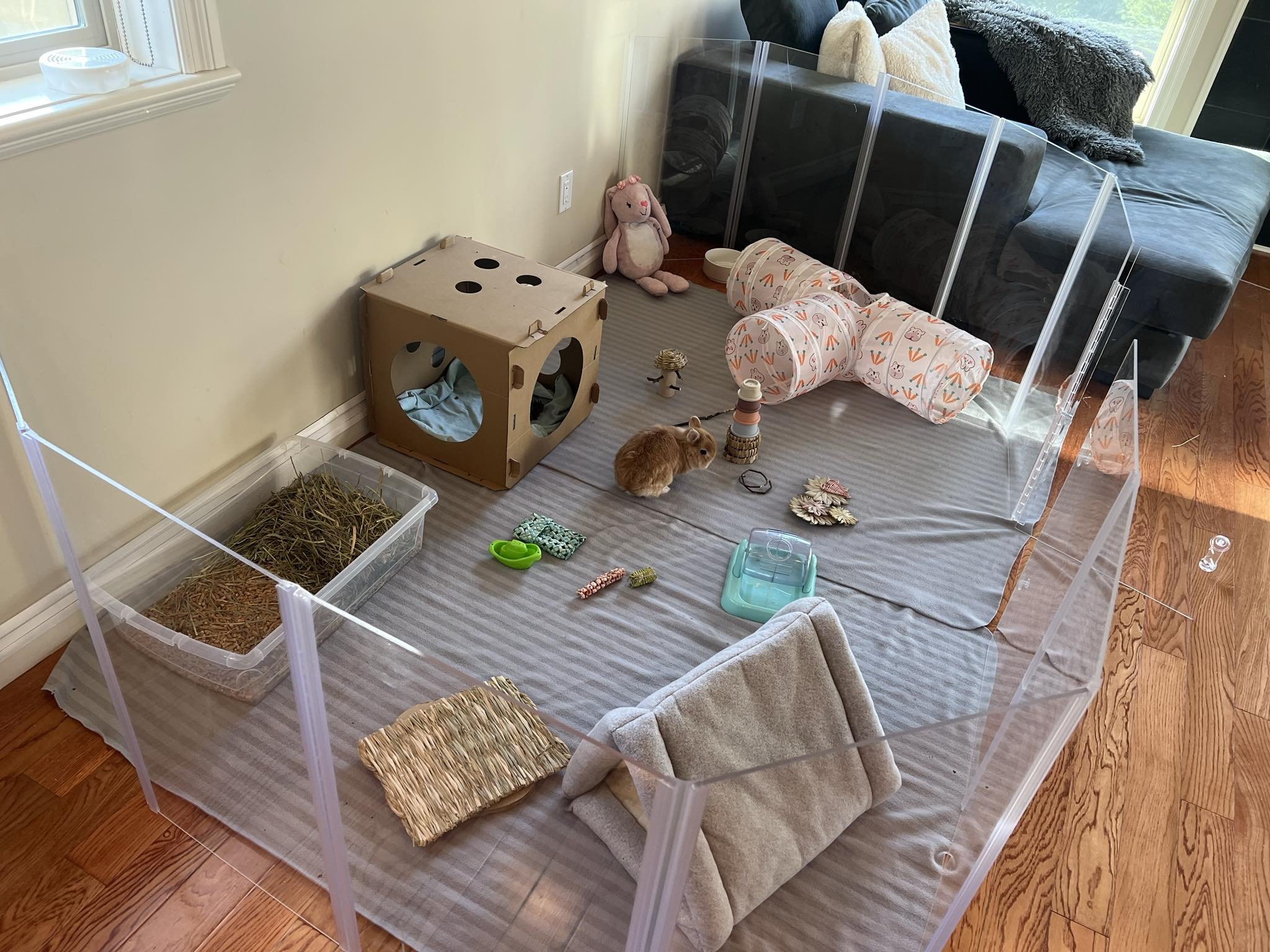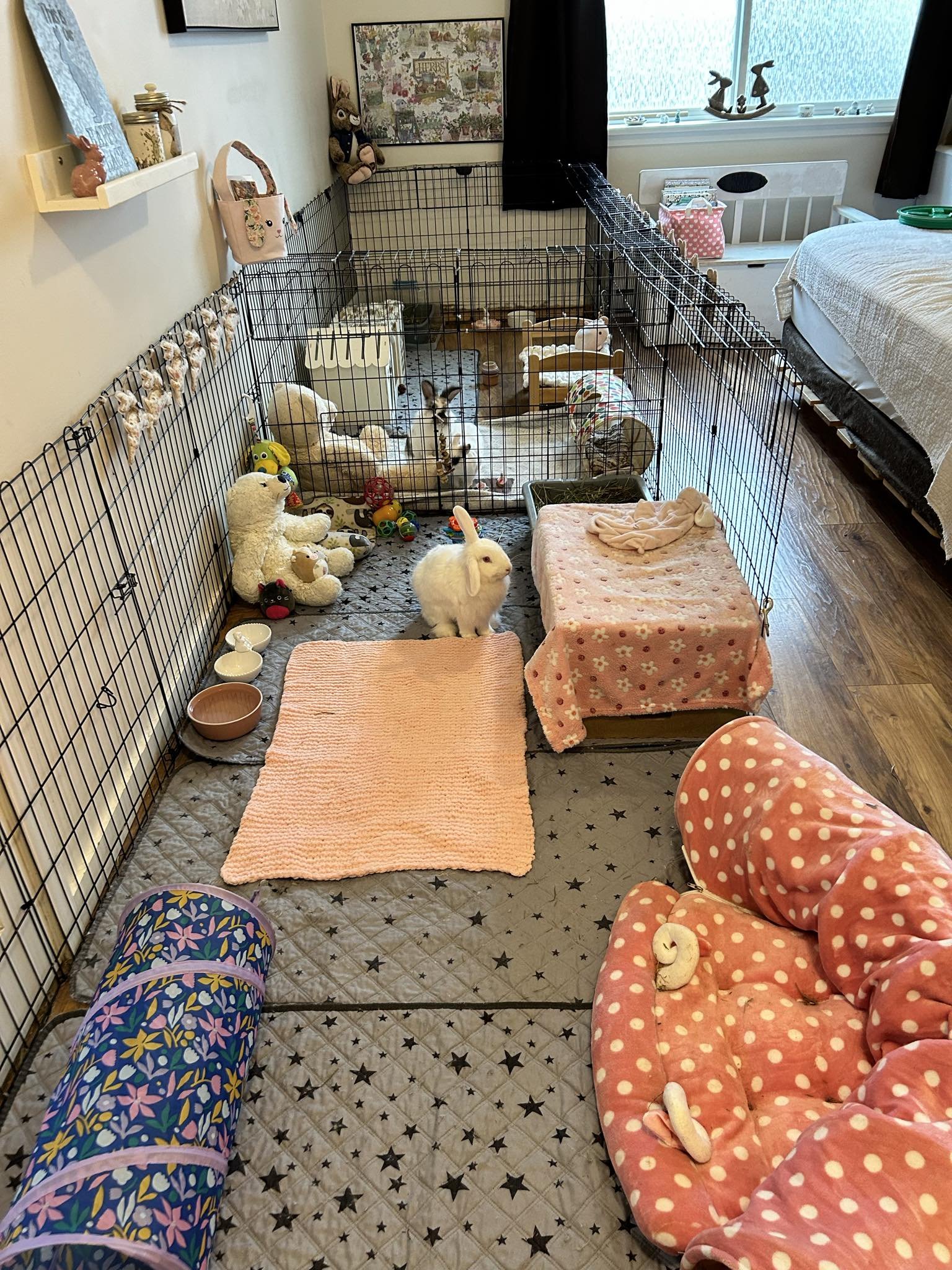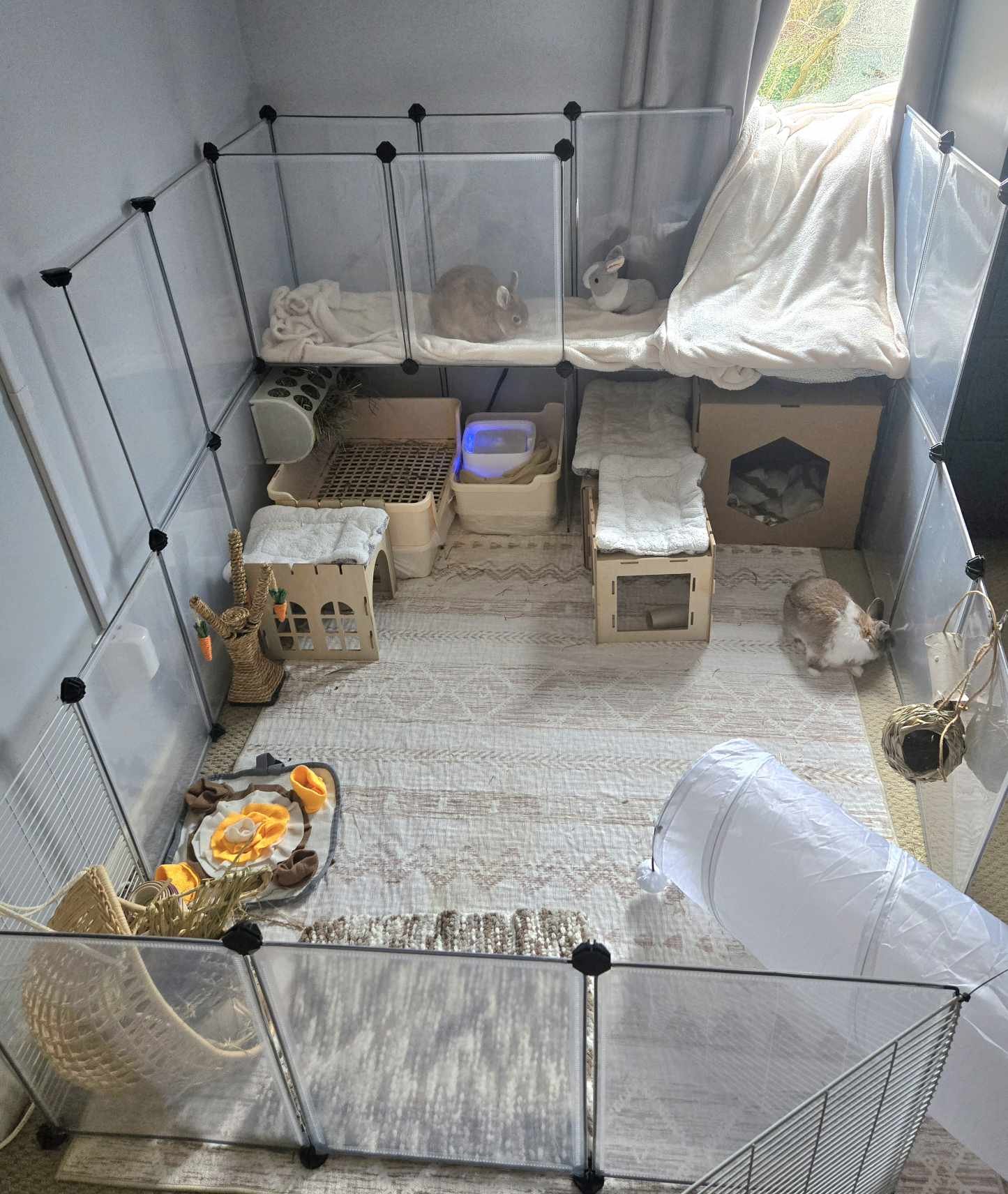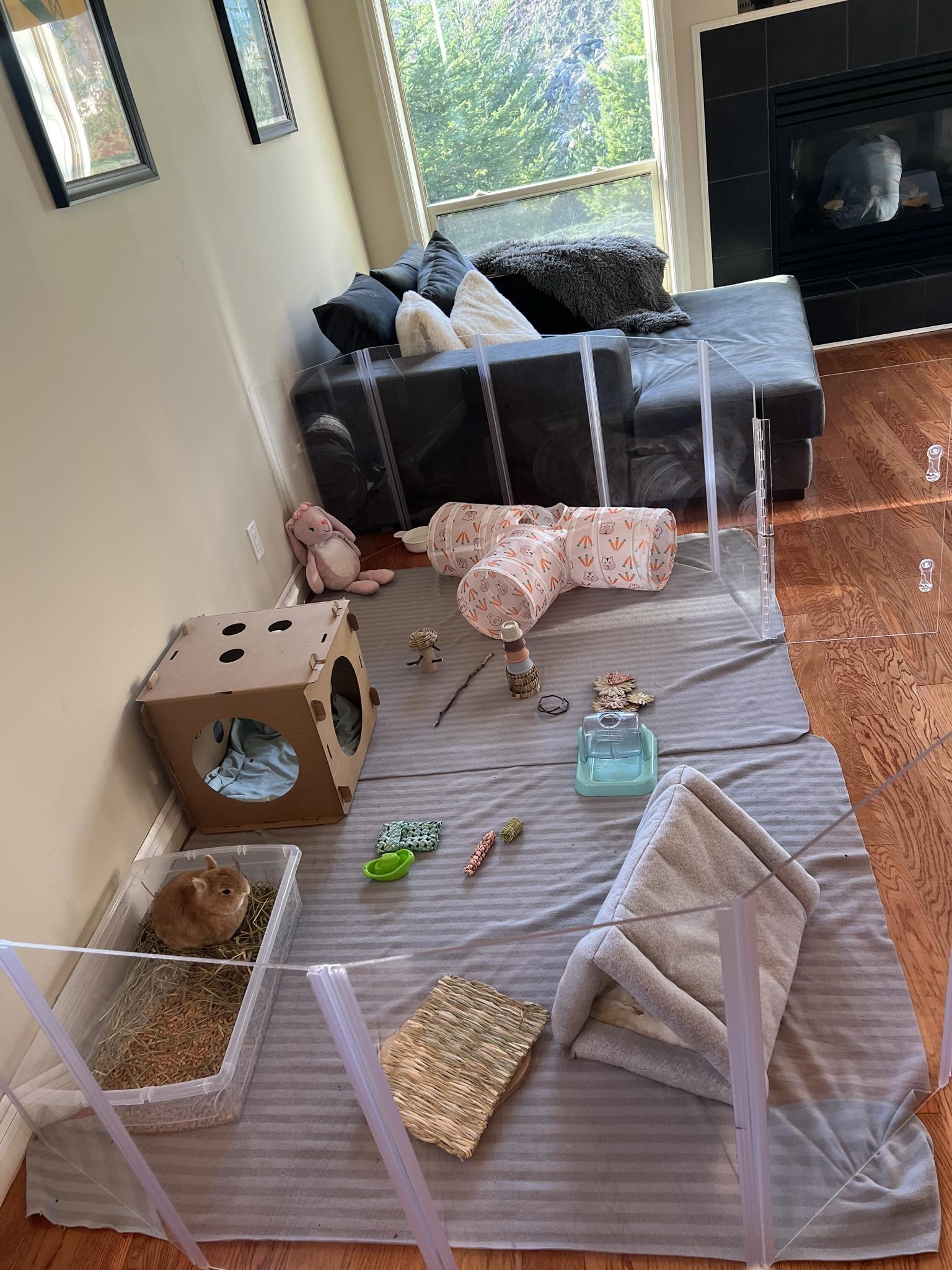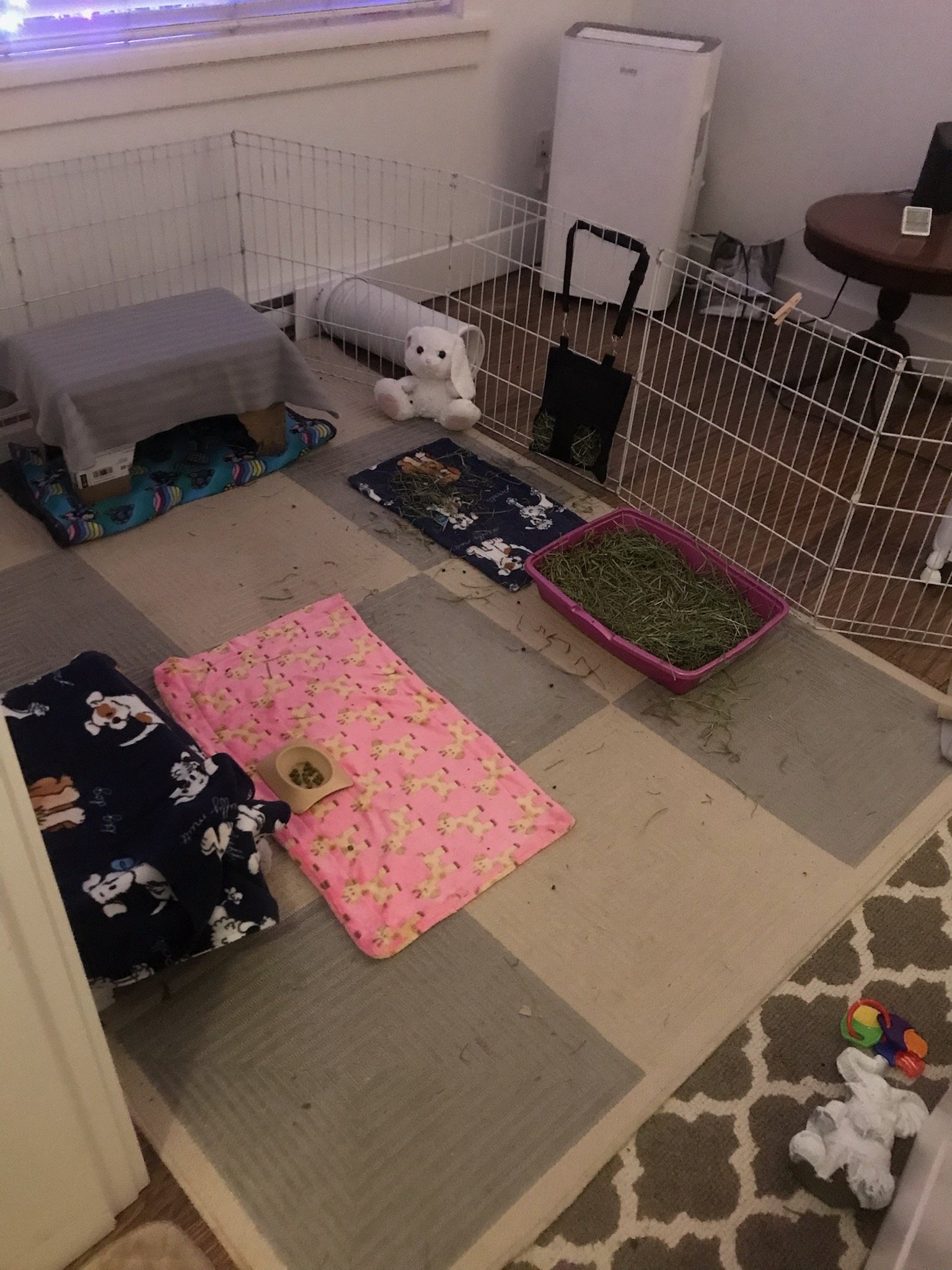
Free Roaming
A rabbit is considered to be free roam, or free range, when they have constant access to the house or apartment, even when their caretakers are away or sleeping. The rabbit lives similarly to cats and dogs. They have the freedom to roam around the house and rarely, if ever, they are kept in a spacious enclosure. A free roam lifestyle is mentally and socially stimulating. This can be a great tool to strengthen the bond you share with your rabbit. Due to their naturally inquisitive dispositions, rabbits can easily get themselves into compromising situations. As a result, it’s imperative to take the appropriate steps to make sure you, your home, and your rabbit are properly prepared and “rabbit proofed” before allowing free roaming without supervision. Rabbits do like to have a home base. This is a place where they can eat and drink, use the litter box, and retreat to when they need alone time.
Bunny Rooms
The world of bunny care is transforming, and people are coming to realize what inquisitive and loving companions rabbits are. As public knowledge and perception of rabbit ownership change, people are learning that by providing rabbits with a spacious indoor home setup, they can truly come to life. With more space to live in, rabbits can begin to exhibit their natural behaviors such as binkying, flopping, running, etc. There is an uptick in rabbit owners providing their bunnies with rooms. This setup provides the space and freedom that free-roaming in a house does but it also provides a more sheltered-off area. It can also be useful if you want to provide a larger space, but your rabbit has some destructive qualities. A bunny room can limit what they can get into. However, not having a full room to themselves is not damaging. This is just one of the types of setups that can be used, but a spacious exercise pen (x-pen) combined with supervised free-roaming is just as rewarding.
Indoor Enclosure
Using an exercise pen with supervised free-roam time is the most common of the recommended ways to house rabbits indoors. It’s a great approach, especially if you have a bunny who is not fully litter trained, in their adolescent stage, or is still adjusting to your home after being newly adopted. Often, people will begin with an enclosure and gradually transition
their rabbits to free-roaming or designate a section of the home, such as a family room, office, or spare room, etc. The more space you can provide, the better. For a single bunny, the space should be a minimum of 4ft X 4ft, and slightly larger for a bonded pair.
Your rabbit’s home base within the enclosure should be an enriching space that makes them feel safe and secure. The enclosure needs to have enough room for their litter box, water bowl, food dish, a hidey house, bedding, slip-free and soft flooring, as well as enough space to play, relax, and engage in enrichment activities comfortably. Rabbits are intelligent and inquisitive creatures, so it’s important to provide stimulation and enrichment that encourages them to express their natural behaviors and ward off boredom and depression.
For your rabbit’s safety, it’s advisable to keep an untrained rabbit in the enclosure when you’re not home to supervise and at night while you sleep. However, your rabbit should never be confined to any enclosure 24/7 full time, as they require regular exercise and socialization. Our motto is, “If you were a rabbit, how would you want to live?” Rabbits are not meant to live in tiny cages, as no animal deserves to be locked up. It’s not a fulfilling or enriching way for them to live.
Moreover, most cages sold or advertised online and in pet stores are not suitable for any bunny, regardless of their size. Before purchasing an enclosure, please contact us to ensure it is appropriate. Having a suitable space is part of the adoption approval process and is crucial for your rabbit’s quality of life.
Bunny Proofing
As with other household animal companions, it’s always wise to animal-proof your space to ensure their safety, preserve your space, and provide fun and creative alternatives for your rabbit to exhibit their natural behaviors. Rabbits are amazing companions, but they do have natural behaviors that can be destructive.
Some rabbits don’t display any destructive qualities, while others do. Getting to know your rabbit’s personality can help gauge what type of enrichment they need to keep those destructive behaviors at bay. Chewing on hard items like hay, sticks, and toys is essential for a rabbit’s dental health to prevent serious complications. Providing these items helps encourage your rabbit to chew on approved items rather than household items.
When starting the bunny-proofing process, get down to their level and look at their surroundings from their point of view to see what needs to be changed. Here are the basic things to either move, attach, or safeguard:
Remove houseplants that the rabbit may access and eat, as some plants can prove fatal if ingested.
Remove wooden furniture that you don’t want your rabbit to test their teeth on. While most rabbits won’t chew on lacquered wood, some will, and until you know your rabbit very well, anything is up for grabs.
Using child gates can be helpful to keep bunnies out of specific areas.
Make sure nothing large could fall and hurt a rabbit if they tried to jump on it or if it were knocked over.
Ensure the rabbit will always have access to their hay and water.
Make sure doors won’t close on them, or they won’t be trapped somewhere.
If your rabbit likes to chew on fabric, remove or move “human” blankets and pillows that you don’t want holes in.
Some rabbits like baseboards or exposed drywall. Either patch up drywall, move furniture to block access to baseboards, and provide plenty of chewing items to encourage positive reinforced chewing practices.
WIRES, WIRES, WIRES! (AKA Spicey Hay) We cannot stress enough. Spicey hay is the #1 thing that rabbits will go after. Wires and cables look like tree roots, and rabbits like to chew them to get the wires out of their way and also just because it’s a satisfying bite. Phone chargers should always be on a high surface to prevent rabbits from chewing through them. Large cables for things like the TV, fridge, lamps, Wi-Fi, computer charger, etc., need to be covered or moved because they can cause burns to your rabbit if chewed through (and they’re expensive to replace). Wire tubing covers work well too. Get creative and secure your wires!
Things like pills, human food, plastic bags, slippers, kids’ toys, people’s clothes, important documents, and more should be picked up because rabbits can chew and ingest all of these items.
If you’re buying new furniture, consider getting furniture that touches the floor that a rabbit can’t get under and potentially chew while in a quiet and dark place.
Like you would for a child, dog, or cat, rabbit-proofing is just one step to owning a rabbit as a companion. Please give grace if your rabbit chews something they shouldn’t. They aren’t bad or naughty – they are just doing what nature intended them to do. A firm “no” and positive reinforcement can help deter undesired chewing. Never reprimand your bunny or use any kind of physical force, as this can cause serious behavioral issues and damage your bond. Bunnies are masters at holding a grudge. They require positive reinforcement and redirection to encourage positive behaviors.
Outdoor Play Areas
At Amy’s Bunny Barn, we strongly advocate for rabbits to primarily live indoors for many reasons.
We also appreciate the beneficial enrichment that can be provided to rabbits through a secure space for outdoor play. It’s important to note that not all rabbits enjoy outdoor playtime, and some may become easily frightened. Watch your rabbit’s body language, and if they don’t seem to be enjoying themselves, bring them back inside where they feel safe. Additionally, if your rabbit is unhealthy or older, there may be a higher risk associated with outdoor exposure.
Benefits of outdoor playtime
Provides enrichment and is beneficial for their mental health.
Rabbits love to forage, and the outdoors offers fresh grass, dandelions, clovers, and more.
The fresh air makes them happy and stimulates their senses.
Sunlight (providing vitamin D) is good for your rabbit’s health.
Safety Considerations
Rabbits should be supervised at all times while outdoors to keep them safe from other domestic and wild animals, such as birds and cats.
Set up a safe and secure outdoor run to keep them inside and predators out.
Ensure they do not have access to toxic plants or chemically treated grass.
Consider the weather; rabbits do not regulate their body temperature well and can be susceptible to heat stroke or hypothermia.
Keep their outdoor space clean.
Add places to hide, ramps, tunnels, and other enriching elements.
Provide shade and access to clean water.
Ensure your rabbit is up to date on their vaccines.
Check for external parasites and treat monthly or as needed


